The second half of the 20th century is the heyday and incredible popularity of minimalism. Born against the backdrop of an unprecedented leap in technological progress, it becomes the embodiment of functionalism and a noble, restrained aesthetics. No variegation of colors, useless decor and pretentious furniture - only simplicity, practicality and spaciousness in everything that are the key components of the design of a living space.
This genre will be appreciated by mistresses scrupulous about order and cleanliness, owners of small kitchens and studio apartments.
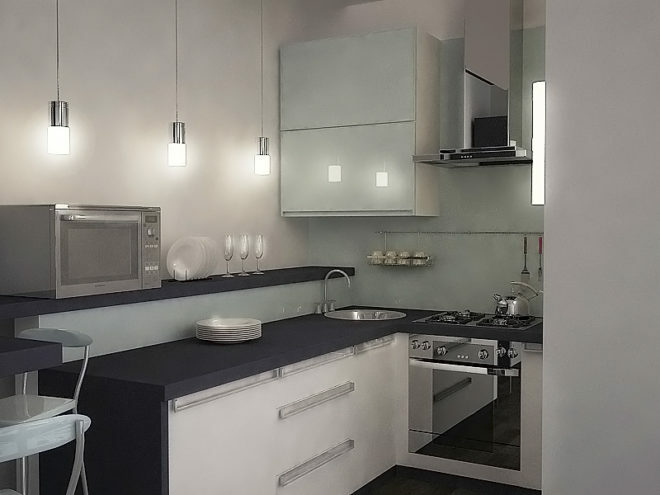
Attention! Earned on our website kitchen designer. You can familiarize yourself with it and design your dream kitchen for free! May also come in handy wardrobes designer.
Features of minimalism in kitchen design
Despite the outward simplicity, maintaining true minimalism is a rather difficult task. Knowledge and adherence to the basic principles will help to correctly build and fill the space in a minimalist style.
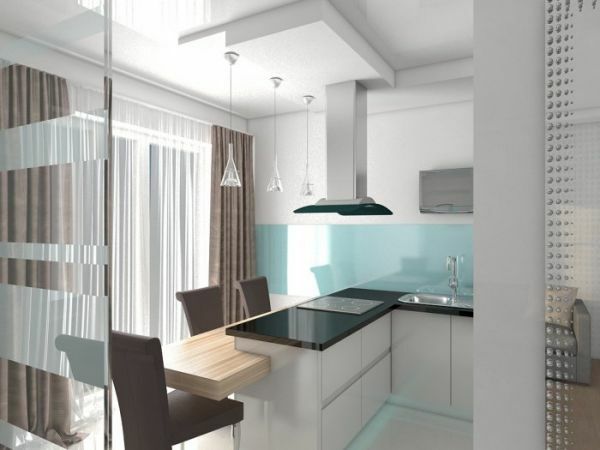
Distinctive features:
- Laconic functional furniture designed in the same style - no eclecticism!
- A minimum of decoration and accessories.
- Good lighting - natural and artificial.
- The predominance of light colors of decoration, color composition - no more than 3 colors.
- The idea of expanding the borders through competent zoning.
- Carefully thought out layout and ergonomics of furnishings.
- The use of built-in household appliances.
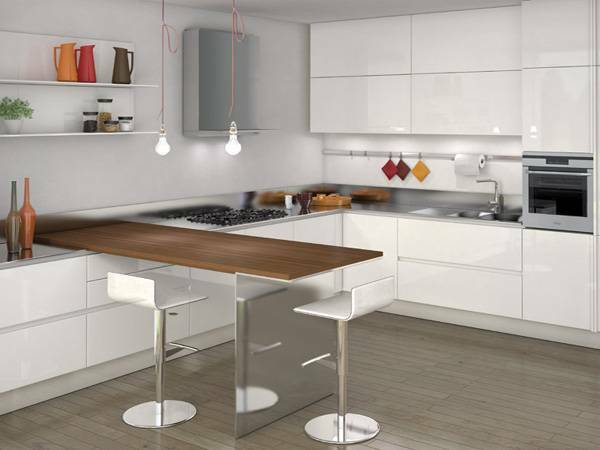
Thus, to embody a minimalist interior in the kitchen means to competently expand the room, make it as much as possible functional, fill it with light, think over a storage system for kitchen utensils and appliances, otherwise minimalism will soon there will be a trace.

Colors of a minimalist style
White is the best color for expanding space. Together with other light shades (beige - considered here, cream, sand) it makes up the basic coloristic palette of the design.
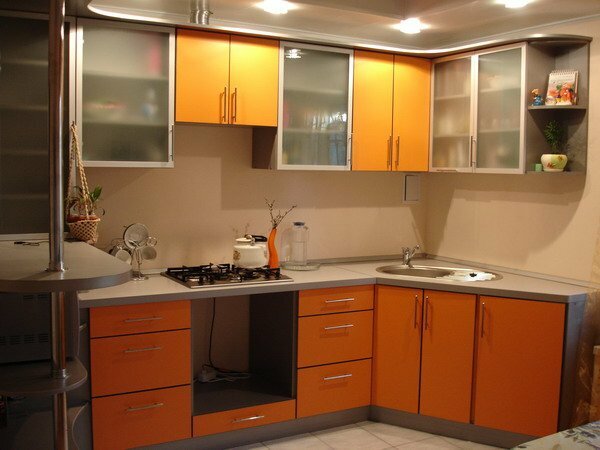
As complementary, 1-2 more contrasting or similar in sounding colors are used. Favorite combinations are white, light with black (for example, in black and white style), gray, brown. Bold combinations with purple, red, light green and other bright colors. It is impractical to use the latter in small kitchens, since bright shades can visually reduce the space.
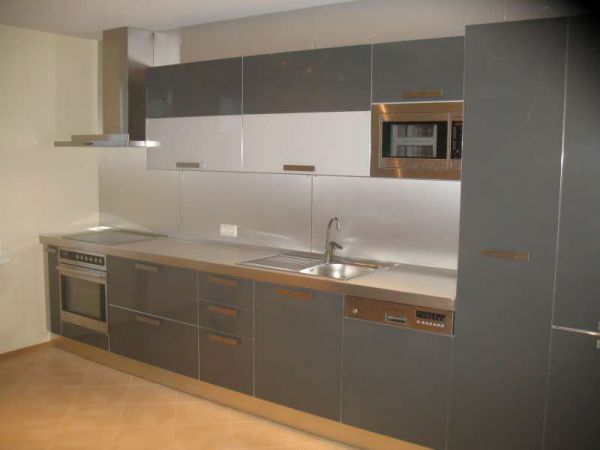
Light colors are used, as a rule, for wall decoration (read more here and here), facades, upper group of cabinets, ceiling. Darker or brighter - for creating accents, highlighting the bottom of the furniture and the floor. Decorating ceilings, walls, furniture fronts, doors and windows in the same color helps to achieve an illusion a single space in which one component smoothly flows into another, becoming its integral part.
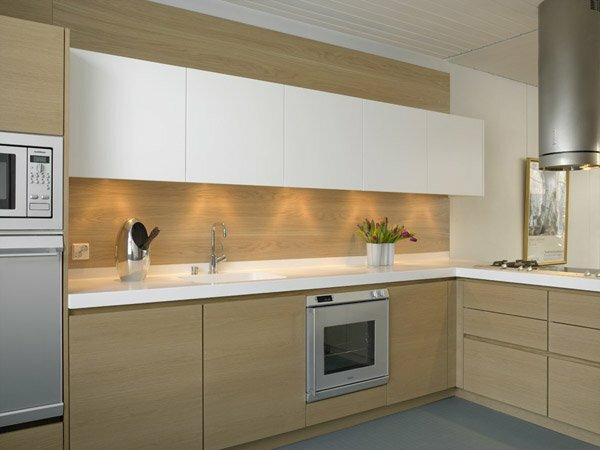
Decoration Materials
The ideal option for finishing a space is a combination of simplicity, high quality and the absence of decorative ornaments. It is envisaged to combine artificial materials (glass, plastic, metal) with natural (wood - more here, ceramics, natural stone). At the same time, the preservation of the natural texture is unacceptable - all surfaces should only be smooth.
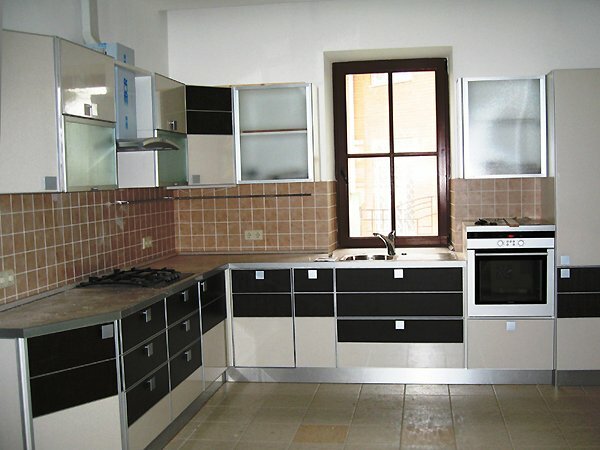
Walls
Absolutely flat, decorated with wallpaper (also see tips for choosing them), paint, wall panels or plaster. One-color colors are allowed without ornaments and patterns. Most often - light pastel colors, visually expanding the space. Rarely - brighter and darker. As a rule, the accent wall in the dining area is designed in this way.
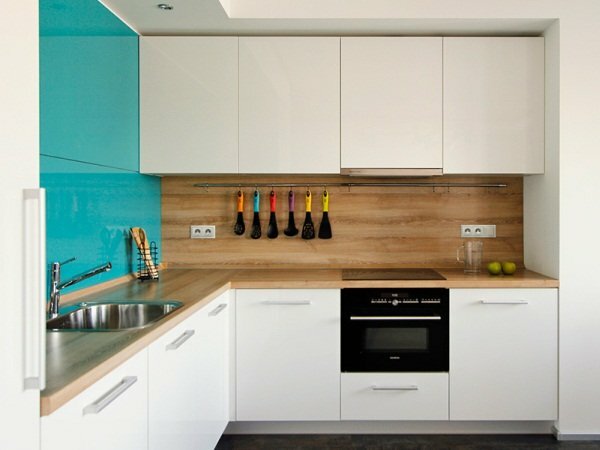
Apron
The work area is highlighted glass (transparent or colored, without ornament), tiles, wood paneling, imitation masonry.
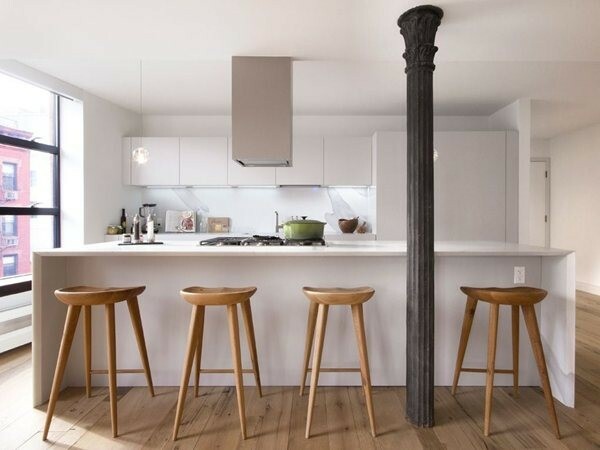
Ceiling
Matt white, less often glossy. Covered with plaster, paint. Plasterboard structures are used only in exceptional cases related to the peculiarities of the installation of the lighting system. Fabric ceilings, ceiling painting and photo printing are not allowed.
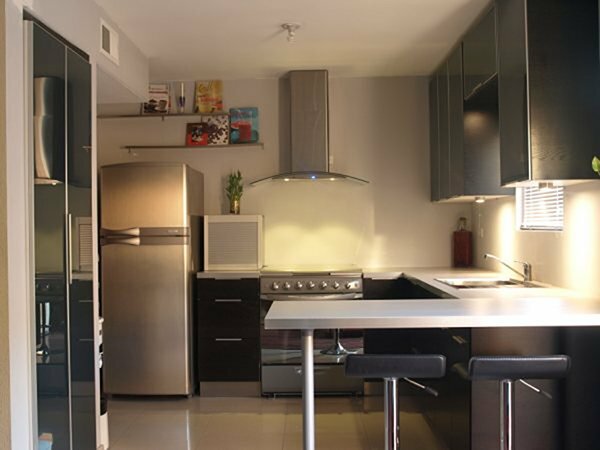
Floor
Almost any material is suitable for its solution - tiles, parquet, laminate, wood, linoleum, porcelain stoneware, etc. Regardless of the finishing material, it should be perceived as a solid surface, as strict and restrained as possible. Preferred colors are gray, light beige, various tones of brown to match or contrast with the color scheme of walls and ceilings.
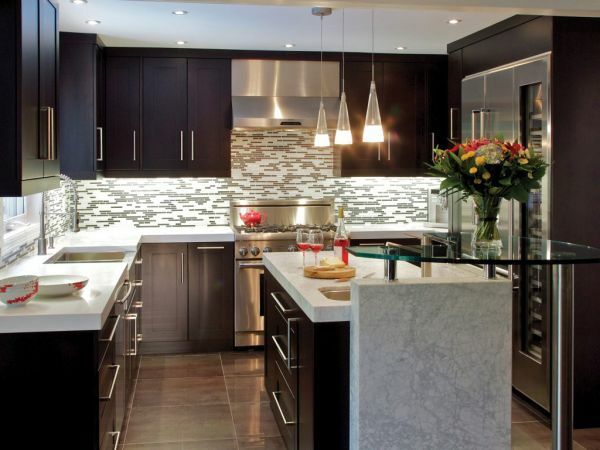
Furniture selection
A dining group and a furniture set with a comfortable working area - the maximum set of furnishings in a minimalist style. All furniture is made only in one style, meets the requirements of simplicity of design, convenience and functionality.
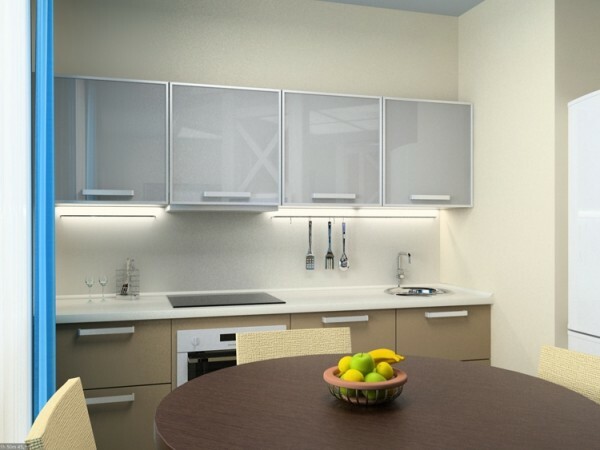
Kitchen set
Should have a smooth facade with a shiny or matte surface texture. There are no decorative elements - the door opening system is used from pressing them. The exception is thin handles in the form of rails on the lower cabinets.
Modern kitchens in minimalism do not allow open shelves - all kitchen utensils, including small household appliances, should be hidden behind blind facades in specially designated internal compartments. Large-scale appliances are built into the set, forming a single monolithic piece of furniture together with the facades.
The design of the kitchen set can provide for the presence of large cabinets of the "pencil case" type with a spacious storage system or be limited only to the lower cabinets, maximally unloading the walls and freeing space.
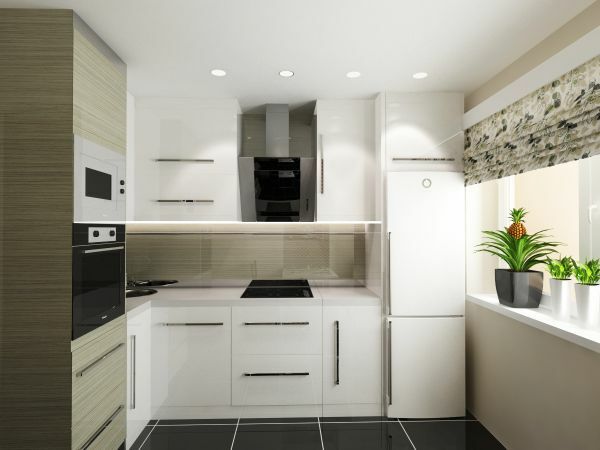
Lunch group
Tables - solid or light, with glass, wood or veneered, plastic tabletops on wooden or metal racks. Round, rectangular or square - the choice is quite large. Chairs in material and shape often resemble office options.
For a kitchen-living room, a table made in a classic combination of a dark or white table top with shiny metallized legs is suitable. Transparent furniture can also transform it. As if dissolving in the space of the room, they visually make it more spacious.
The use of built-in and transformable furniture is also encouraged - folding chairs, sliding tabletops, various retractable pieces of furniture. This emphasizes the high-tech and modernity of minimalism. This feature allows you to embody the characteristic features of the style in small rooms where it is problematic to build other solutions.
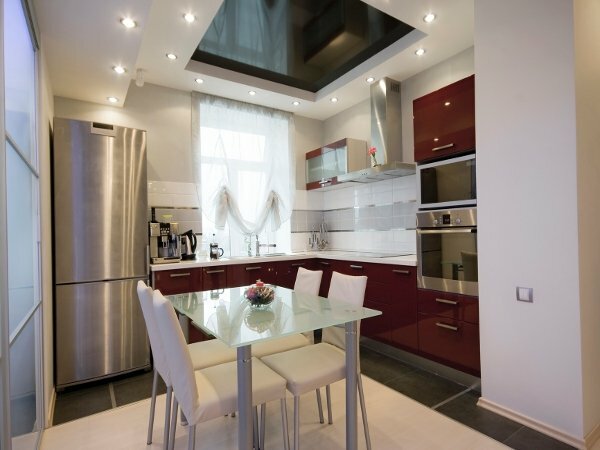
Interior lighting features
The minimalistic design is characterized by an abundance of light, which helps to create the effect of a spacious room, even in a small kitchen area. The right lighting design can also liven up austere interiors and smooth out the coldness inherent in this genre. It is also recommended to decorate with an abundance of light - more space “opens”.
There should be as much natural light as possible, which is important to take into account even at the design stage. It is great if there is an opportunity to enlarge the window openings, and leave the windows themselves without textile decoration.
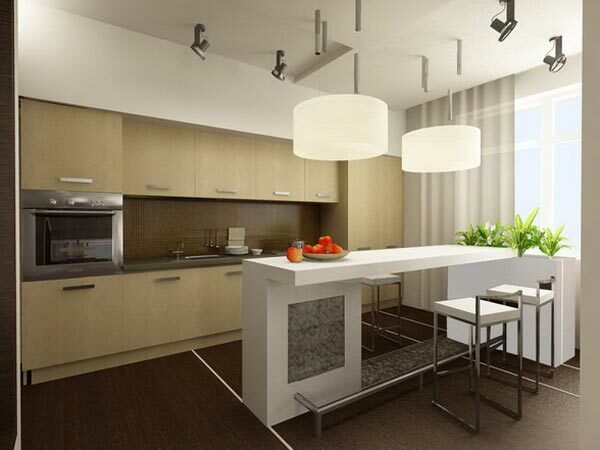
There should be many sources of artificial lighting. Various combinations of a large central chandelier and several spotlights, table and basement illumination, bus lamps, light panels successfully fit in.
The design of chandeliers and lamps is possible as simple and restrained - to have the shape of a ball, prism, square and other geometric shapes, and non-standard - in the form of atoms, Japanese origami, etc. But the colors are only seasoned - it is better to reserve painted plafonds for another design.
As a material, plastic, metal lamps, with glass or wooden elements will be appropriate. They make the interior laconic.
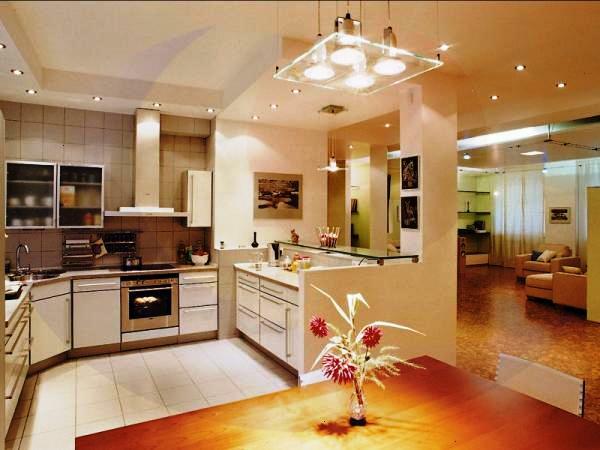
Minimalism style in accessories and decor, photo
Laconicism and functionality do not need an abundance of decorative elements. All their beauty lies in simplicity and restraint. But the use of a limited number of carefully selected accessories is not prohibited.
As a decoration, it is worth considering the original wall clocks, spectacular posters, paintings and photographs, in no more than three.
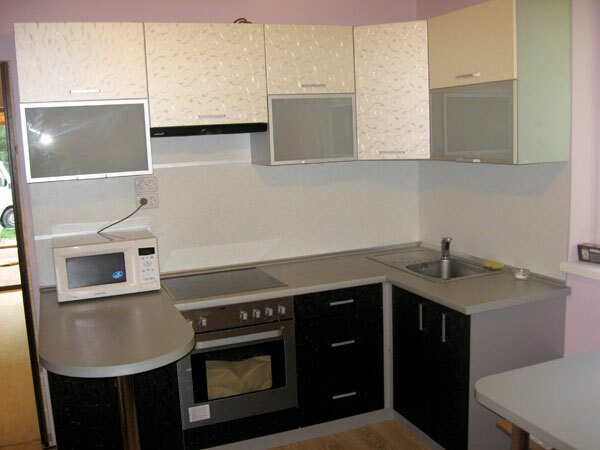
An unusual vase, stylish containers for spices, non-standard chandeliers and sconces (their choice was considered in this article).
It is better to choose curtains that are discreet, neat, without excess volume and decorations. Preference should be given to matte monochromatic options with a simple design. This roman, roll, bamboo curtains, wooden or metal horizontal blinds. The color of the curtain fabric is neutral or contrasting with respect to the general color scheme.
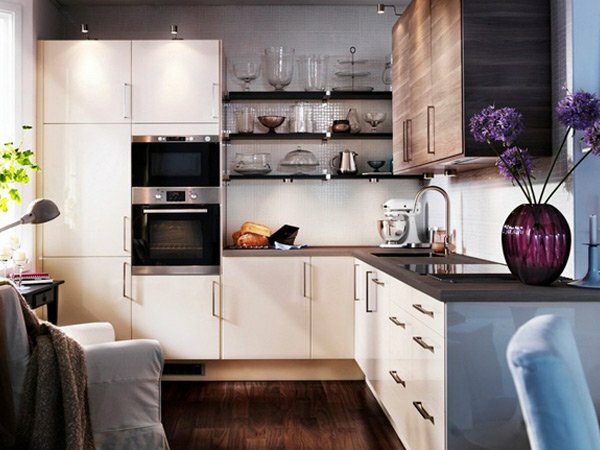
In the conditions of an abundance of plastic and the use of a gas stove, single indoor plants - chlorophytums, succulents, aspedistra and the like - will become an indispensable element of decor. They are best placed in wood, ceramic, or plastic pots that are designed to match the overall style.
A kitchen whose interior is designed in a minimalist style will never lose its relevance. No matter how much time passes, it will remain fashionable, elegant and modern, emphasizing the good taste and subtle sense of style of its owners.
average rating 0 / 5. Number of ratings: 0
No ratings yet. Be the first to rate.


